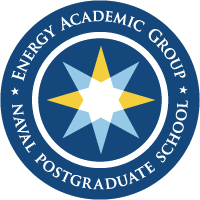August 22 2023 - Energy Academic Group
Why Energy? A Programmatic Perspective of the U.S. Navy's Afloat Energy Challenges
August 22, 2023 | 12:00–1:00 pm PST | MAE Auditorium, Bldg #255 — Campus Map
Mr. Michael T. San Antonio
R&D Program ManagerFleet Energy Research and Development Program (FERDP)
Naval Sea Systems Command, Washington DC
Abstract
The U.S. Navy requires immense amounts of energy in the form of liquid fuels and grid electrical power to meet its mission. Over the past several decades the Navy has been able to fight and execute its mission with little threat to afloat fuel logistics support. The recent transition in focus towards peer competitors is changing the equation, and in theater fuel logistics is becoming increasingly more important. This talk will cover the U.S. Navy’s afloat energy challenges from the perspective of an R&D program manager at the Naval Sea Systems Command’s engineering directorate. It will discuss four high level reasons why energy is and should be critically important to the Navy, take a look at how the Navy’s surface fleet has or has not become more efficient over the past several decades of ship designs, show what one program within the Navy’s R&D portfolio is doing to improve the Navy’s energy posture, and lastly describe the speaker’s perspective on the Navy’s major technical areas and challenges today and into the future with respect to shipboard power and energy consumption.
Biography
Michael San Antonio has been with NAVSEA since 2009. He currently serves as the program manager for the Fleet Energy Research and Development Program within the engineering directorate’s technology office. As program manager, he is responsible for managing current and future year budgets, overseeing the schedule and execution of all projects in the portfolio, and leading a team of 6 government and contractor personnel. He ensures all projects have a transition strategy in place and that the lessons learned from the research, development, and prototyping are used to inform future technical decisions or lead to the fielding of advanced technologies to the fleet.
Michael’s first position at NAVSEA was Lead Engineer for Aviation Support Systems, and in 2015 he took on the role of Engineering Manager for Deck Handling Systems. His responsibilities included maintaining a portfolio of technical standards and specifications for systems such as aircraft elevators, helicopter hangar doors, boat davits, stern ramps, and boat and cargo handling cranes. He was also responsible for addressing safety and performance issues, including reviewing ship system modifications, updating maintenance requirements, and approving deviations from specifications. In 2017, he led a team of over a dozen engineers in developing a new design practices and criteria manual for launch recovery, and handling of surface and subsurface vehicles from surface ships. His vision as an engineering manager, effective leadership skills, and successful delivery of this and various other technical documents earned him a Meritorious Civilian Service award in 2018.
Michael graduated from the University of Virginia in 2009 with a B.S. in mechanical engineering and from Georgia Institute of Technology with a M.S. in mechanical engineering in 2015.
Michael’s first position at NAVSEA was Lead Engineer for Aviation Support Systems, and in 2015 he took on the role of Engineering Manager for Deck Handling Systems. His responsibilities included maintaining a portfolio of technical standards and specifications for systems such as aircraft elevators, helicopter hangar doors, boat davits, stern ramps, and boat and cargo handling cranes. He was also responsible for addressing safety and performance issues, including reviewing ship system modifications, updating maintenance requirements, and approving deviations from specifications. In 2017, he led a team of over a dozen engineers in developing a new design practices and criteria manual for launch recovery, and handling of surface and subsurface vehicles from surface ships. His vision as an engineering manager, effective leadership skills, and successful delivery of this and various other technical documents earned him a Meritorious Civilian Service award in 2018.
Michael graduated from the University of Virginia in 2009 with a B.S. in mechanical engineering and from Georgia Institute of Technology with a M.S. in mechanical engineering in 2015.
Related Resources
Presentation Slides
Contact Us - Sidebar

